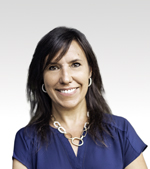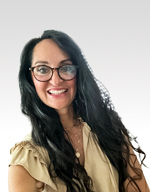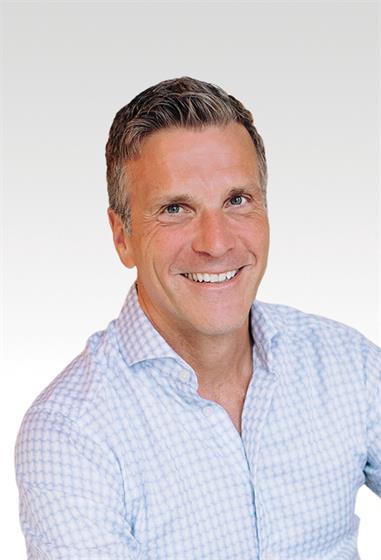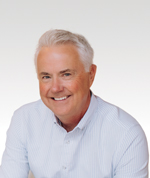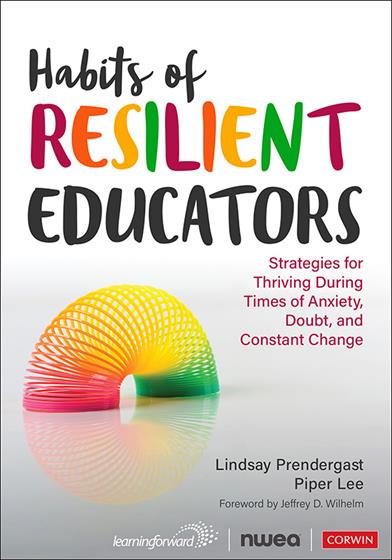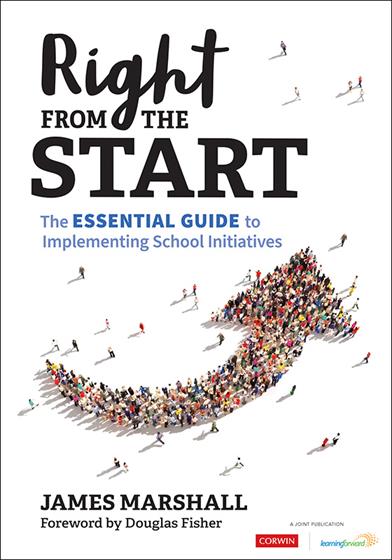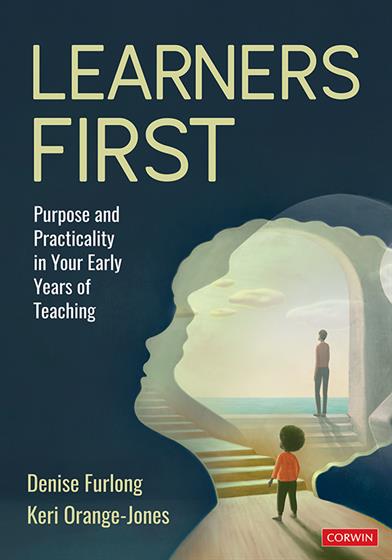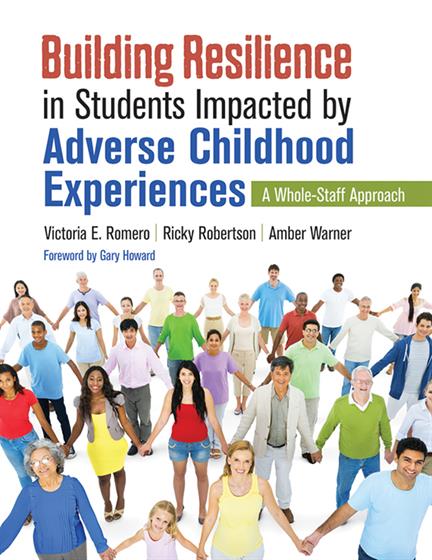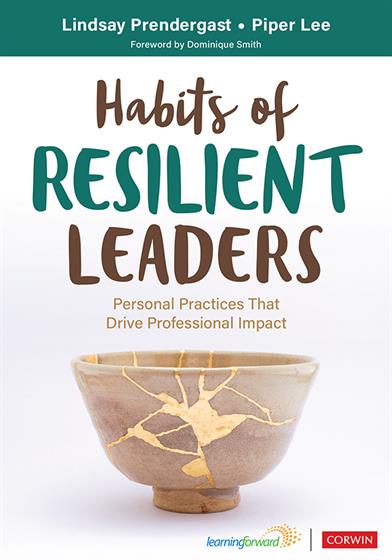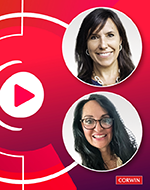LINDSAY PRENDERGAST: Well, I think a fun piece of the book, too, is that we think about the intersection of the professional
practice with the personal practice. So let me also preface that with saying that while Piper and I might share interesting ideas with
you and your audience about these habits, we're not the master of these habits. On the contrary, we have learned things that we
can do better ourselves. But it's thinking about the habits of where those intersections lie.
ANNOUNCER: Welcome to Corwin's Leaders Coaching Leaders podcast with hosts Peter DeWitt and Michael Nelson. This
podcast is from education leaders for education leaders. Every week, Peter, Mike and our guests get together to
share ideas, put research into practice, and ensure that every student is learning not by chance, but by design.
PETER DEWITT: Lindsay Pendergrast and Piper Nichols, welcome to Corwin's Leaders Coaching Leaders podcast.
LINDSAY
PRENDERGAST:
Thank you so much for having us. It's great to be here with you today.
PIPER
NICHOLS:
It is truly an honor to join you.
PETER DEWITT: Now, Michael and I met you-- we met you last summer at the annual Visible Learning Conference, and you both
were this just positive storm that came in. Like you were a force to be reckoned When you were coming across
the way to meet up with us. It's really nice to see you here.
We'd like to talk a little bit about-- you have a couple of books. You have one that came out, you have one that's
going to be coming out. And I think it would be great to talk about both, because there are definitely
commonalities and things to focus on. So the book that you had come out last year is called Habits of Resilient
Educators. So Piper, talk to us a little bit about where this book came from and why you wanted to focus on it.
PIPER
NICHOLS:
So Lindsay and I had the opportunity to work elbow to elbow, much like you and Mike, and we were able to
observe over 3,000 instructional rounds and professional learning sessions PLCs together. We were each other's
thinking partner as we were supporting leadership teams in the district, in the schools, and then closely with the
educators.
Through that, we definitely saw some really exciting things taking place. It seems like there's always doom and
gloom about educators. And we just were really seeing some positive outliers. And we started to think about
what is creating these resilient educators. They had come through the pandemic. Some of them were brand new
and maybe had done their student teaching in the pandemic. Some of them were veteran teachers and just
committed to staying.
And so what were those habits that were separating those that were fleeing the profession from those that were
just continuing to thrive in the uncertainty? So I'll invite Lynn's. What else can you say about that?
LINDSAY
PRENDERGAST:
Well, we can't have a conversation without at some point bringing up Harry Wong. Very, very instrumental for
both of us in our early careers. So we often thought about those pieces that stood out in our learning from Harry
many years ago. But again, as we watch these educators at varying ranges in their career, it was those that were
really still thriving essentially, at this difficult time.
We're leaning hard on routines and habits and practices that they just instilled. And it's not necessarily rocket
science new innovative things that we discovered. It's going back to the foundational skills that we felt like we
benefited from developing in that time and lifting out those pieces in the current context. So just a piece there
that, again, we cannot have a conversation about our book without bringing up Harry.
MICHAEL
NELSON:
Well, you've given a great anticipatory set. Our listeners right now, if they're in their car, they're leaning forward.
They're like, OK, give us some. What might you be able to share with us right now in this moment because our
listeners are on the edge of their seat?
LINDSAY
PRENDERGAST:
Well, I think a fun piece of the book, too, is that we think about the intersection of the professional practice with
the personal practice. So let me also preface that with saying that while Piper and I might share interesting ideas
with you and your audience about these habits, we're not the master of these habits.
On the contrary, we have learned things that we can do better ourselves. But it's thinking about the habits of
where those intersections lie. So it starts out, for example, with purpose. Both of us have had the good fortune in
our times, in our careers of really grounding our work in our why, and we saw people drifting away from that in
the pandemic.
And loosening of that thread to their work was really causing them to feel that experience of burnout. So that's
an introductory habit, for example of really that is something that can nurture you and sustain you and it sits in a
place of both your personal well-being, but also your ability to feel confident and capable in your professional
practice. So, Pip, I know you've got ideas there too.
PIPER
NICHOLS:
I just think that like Lindsay said, when we observed these habits, I wouldn't say that one rises above another and
that resilience really runs through them. And so we talk about resilience as the 10th habit, but it's all of these
collective habits that really build that resiliency. And so we laugh and we'll say oh, I got to go back to the habit of
goal setting or procedures and routines myself because it's not something that any one educator or the two of us
are perfect at. It's something that we're constantly balancing and working through.
So it was really the collective habits that were creating this resiliency. We talk a lot about-- resiliency is all-- it's
kind of a buzzword right now. And it can almost be negative or used negatively like just be resilient and meaning
I'm going to give you a coffee cup and keychain and pat you on the back and send you on your way and you just
have to keep working hard. And that is not at all what resilience is. There's actually a science to resilience. And
so these habits feed to that aspect of the profession.
PETER DEWITT: I think-- and that's great. I think sometimes because you both have started to say that you haven't mastered the
habits yet, but I sometimes wonder if that's why we pursue them so strongly when we're writing and when we're
doing work, because those are areas that we want to learn more about.
Michael and I right now with our long-term work, we're spending a lot of time looking at data and evidence and
having those kind of conversations around multiple measures. That wasn't always a place where I mastered. And
I actually had a webinar this morning where I told the group that it was an area that was not an area of strength
for me, and that's why I wanted to pursue it so much, because I felt like it was something that I wanted to learn
more about.
So I don't think it's strange at all that you would say these are habits that are really important, but we haven't
mastered them yet, because I think that's why we actually pursue them in the first place as researchers and
writers. So I appreciate that.
Piper one of the things you were just talking about was the whole idea of resilience. And I think any word can be
used so much that it's like your favorite song when you first hear it, and then it's like, I don't want to hear that
word ever again. Like fidelity and those kind of things. And resilience has been used positively and negatively.
But part of what you were talking about was the idea of well-being. And I think you hit a pretty-- you were pretty
solid in what you said, which is give them a coffee mug and a keychain and pat them on the back. And that is
something that's happened quite a bit where in the world of being. So I know that one of the things that you
focus on in your book the resilient educators part, is an environment that school leaders can help set up so you
can focus on well-being.
And there's been an explosion in well-being research over the past decades. But it's definitely been a boom since
COVID. So what kind of environment? Because I think leaders struggle with that. I think leaders will say we care
about well-being, but at the same token, they're like, she's such a hard worker, she even comes in on weekends.
And it's a badge of honor. How can leaders set an environment where well-being are not just words that they use,
like resilience, but it's actually part of the culture that is established with teachers?
LINDSAY
PRENDERGAST:
Could go and talk about this for days. Peter, that's a great question. And building on what Piper shared there
about the idea that resilience in some cases has been used negatively against teachers, that led us to the next
book, which is coming out on habits of resilient leaders. And there are strong themes in that talk about the
understanding for themselves of their own well-being, but also creating the environment that you just described
where teachers can experience it.
And I think for us, what we did do was learn an enormous amount ourselves as well about the reflection, the
opportunities to understand human needs essentially in an environment like that. So you just mentioned
something that really hits home for me, where they may say oh you know what? That teacher's got it though.
Resilience is not even a need for them because they're so hard working and they're dedicated and they're going
to tie themselves in knots.
And we have another phrase in this book that we say that is teaching sits at the intersection of mundanity and
sainthood. And it's that idea that as a society, even we are susceptible to placing teachers in a position where
you're expected to tie yourselves in knots. And that's just what you do. And yes, teachers are terribly giving
people-- wonderfully giving people, I should say, who likely got into the profession for a sense of value in the
service aspect. So do leaders for what it's worth.
But leaders have an opportunity there to help them, not literally drain themselves to below zero and remove
them of the capacity to be effective and feel good and experience well-being and feel positive, and that they can
have a personal life and be rewarded and fulfilled in that aspect. So case in point, toxic productivity is something
we talk about that I'm a sign wrapper, you want me to get involved? Just ask.
If we know that about a person who works for us, how do we then say, hey, look, I'm not going to ask you to do
that because I see how much you have on your plate right now. It might be fun for you, but we're going to look at
a different time so they can create those environments and those structures that help people manage their own
boundaries.
PIPER
NICHOLS:
And Lindsay, I'll just add to that one of the first boundaries we write about in the leadership book that comes out
in June is actually the habit of boundaries. And so helping educators, leaders make sure that they are managing
their calendars so that the calendar doesn't manage them and being a role model in that space.
So as the district leader or the building leader not sending out emails on a Saturday morning or at 8 o'clock at
night, because we all look at that time stamp. And so when you're under somebody that is leading that way, it
breeds that toxic productivity and really toxic culture. And so we talk about healthy boundaries. That doesn't
mean-- it can be swung the other way. Everything in moderation.
And so helping as a leader to prioritize and think about-- a lot of times I've seen and Lindsay I've talked about this
a lot, we've seen irate parents come into an office and maybe a teacher is meeting with a leader, and all of a
sudden the irate emotional situation takes over and the leader runs with the emotion instead of saying, I'm going
to give this permission to pause and this teacher in front of me or this student, whatever that is actually urgent,
you're right in the midst of that and providing some space for the emotions to die down, set up an appointment,
make sure that the people feel, seen, valued, and heard.
But actually doing that by I'm going to follow up with you. I want to do that. But also making the person, whether
it's an educator that's getting some feedback from you and you have an appointment with-- they feel valued by
their time as well. So there's some boundaries there that I think leaders need to be mindful of, of how they are
showing up and how they're modeling for the educators and students in their building.
MICHAEL
NELSON:
Well, you've made the switch to Habits of Resilient Educators to Habits of Resilient Leaders. So congratulations
on your second book that, as Piper said, looks to be out in June from Corwin. You talked about all of the interviews
and the connections you made prior to habits of resilient educators. What was the foundation and what did you
do in preparation for this new book?
LINDSAY
PRENDERGAST:
So they were-- actually, I would say this book was in our head before Habits of Resilient Educators was
incidentally. So what Piper described of the experience where we spent several years in one district every single
day in different schools, working with these leaders, we were directly hip to hip with the leaders themselves in
these experiences.
So when we designed the book, it sat in a space of saying that the teachers certainly we pulled out all of those
trends and those patterns, it made sense to write that one first, but the other one for leaders was being written
right alongside that. And it only I think, became easier to pull out the salient points as we were then working on
the first book and working out in schools continuously in other districts at the time and seeing even more
evidence. So we just continue to gather those trends, we also have some incredible thought partners.
And we pull from experiences case in point of seeing the two of you at AVL last year and listening into the
conversations you were sharing in your presentation. So looking at all sorts of different research, but also our
own experiences and the conversations directly with leaders that we work with as thought partners it o poured
out.
[CHUCKLES]
PETER DEWITT: So I have a question. For listeners who don't know a lot about you, what's your background? Because it plays a
huge role in what we do. Michael is a former teacher and principal and Superintendent of the Year for
Washington State and worked with the Washington Association of School Administrators.
I have a teaching background, and I was a school building leader for eight years. What is your background and
what led you to this place? So I'm going to start with you, Lindsay.
LINDSAY
PRENDERGAST:
Sure. Yeah. So am told, somewhat unusual approach into the leadership pathway because I started out getting a
master's degree in school counseling. And I had a really unique and very wonderful experience as my first role as
an administrator, where I was both an assistant principal and the guidance counselor in a secondary setting.
And people would always say to me, isn't that a conflict of interest? And I said, actually, I think it should be
required, because the approaches that I learned in that counseling realm really led me to experience, I think,
more strength in that social emotional aspect as a leader and really thinking through those practices from a more
human centered approach.
So that's a standout feature in my own path-- my original career in teaching was in special education also, so that
certainly I would again advocate that everyone should have to spend some years as a special education teacher
for so many reasons. The relationships, the pedagogy, the understanding of all the different learning styles, you
name it. But those two lenses really, I think, shape a lot of the way that we think about our work in schools now.
PETER DEWITT: So I want to come back to that for just a minute. I taught inclusion for seven out of 11 years and I was the
General Ed Teacher, but I learned a ton from working with the special Ed teacher. Co-teaching, all of these things,
had he talks about them like we did that but it was a wonderful experience, especially for those who may not
have had the greatest pre-service teaching program that on the job training is really awesome.
And you made me think of my friend Tim Dawkins. He's an Assistant Superintendent north of me in South Glens
Falls, New York. And he was a school counselor before he got into administration. And he took some grief for that
and ended up writing a guest blog for Education Week on why it was important-- why we need to consider the
importance of somebody who went from school counseling to administration. So you just made me think of that.
So I think that's wonderful. Thank you. Piper, what about you?
PIPER
NICHOLS:
So I spent 11 years in the classroom, mostly Gen Ed. Three of those years I did teach multilingual learners. I was
an El teacher. I was in one district in Minnesota. I point that out because one thing that I've thought a lot about is,
I was in Rochester, Minnesota and home of Mayo Clinic, and why that is important, is because it's really a science
academic community, and they are all about their medical rounds.
And one of my kids was in the hospital a lot for some chronic challenges, and I watched those medical teams,
whether it was a medical student, a nurse, a surgeon, come together and collaboratively do their rounds for
many years. And so then when John had he wrote his instructional rounds, I was like oh, that totally makes sense.
And we need to do more of this in education.
I also was an instructional coach, Director of Instructional Coaches. I also was a professor of the ethnographers of
language. So literacy junkie and have been in this coaching space for leadership for about a decade. And so I do
have to say, though, the one thing I did that was a little brave and crazy, was I went back to the classroom the
year of the pandemic in Florida.
I had a friend that was an administrator, and she said, you always wanted to go back because just like you said,
Peter, we learn these things. And it's not that we were great at it and we can help and we can see the impact as
we learn, even in these coaching spaces, I wanted to take all that I had learned just one more year back in the
classroom.
And it was like grandma goes back to school. So I feel like in that space, I was able to really understand more
about what the educators were really feeling, whether it was expectations or the technology changes. It was a
really, really grounding year for me. I enjoyed it very much, and I also enjoy how that has impacted my thinking
now.
MICHAEL
NELSON:
Fantastic. Well, I'm going to ask a question and then let Peter begin to wrap our time together up. The theme for
season 9 of our podcast is navigating leadership. And I know the two of you are very busy. And in the last year
since your book came out, you've been busy connecting with audiences and participants and schools about the
essence of your book.
And I would love to hear a story or a soundbite from those presentations about your book that was brought a
smile to your face, or gosh, I wish that could have been included in the book. That story is a great story. If we
ever rewrite this book, I want that in there, something that our audience might glean from all of the-- you've been
all over doing these presentations about the book, so share one little snippet from that.
LINDSAY
PRENDERGAST:
I'm thinking of one that happened to you, Piper. But if you have one, go for it.
PIPER
NICHOLS:
I actually was like, super funny because we were in the Visible Learning Conference in your session, and the
ladies--
MICHAEL
NELSON:
People were talking about you in our session. So that is a start so far, Piper so keep going.
PIPER
NICHOLS:
I know, no, we were in your session learning great things. And we were just like, oh my gosh, we're so connected
with what you were saying. But the lady next to me, she keeps staring at me. And finally she pulls out our book
and she's like, you're the authors. I've read this and it's made such an impact, and we're doing a book study at
our school and it's really changing our mindsets.
We wrote the-- one of the ninth habits that we wrote about, was not navigating negativity. And she said, we
really, really dove into this. And would you come on and do just an introduction to the book study. So it just was a
fun connection for us, but it actually happened in your session.
PETER DEWITT: That's very good. I'm glad we brought you guys together.
MICHAEL
NELSON:
Yes, we planned that. We said, you need to sit here because we believe Lindsay and Piper are going to come in
and they're going to sit there. So you're welcome.
LINDSAY
PRENDERGAST:
Thank you.
[LAUGHS]
MICHAEL
NELSON:
All right Lindsay. Do you have something Lindsay?
LINDSAY
PRENDERGAST:
I'd love to because this is one that did happen to Piper, but we brought it up in numerous other instances, and it
really just takes the room. You can hear that
[EXHALES HEAVILY]
So we have an intro slide we will often share. That's a metaphor for whatever teachers tend to think it may be a
metaphor for. But you can get the idea when I tell you that it's an image of an ocean crossing freighter with its
cargo, and it's being tipped over in the midst of an ocean swell. And so we think about this metaphor of what
does that relate for you to the path of teaching and current environment we live in.
And people were chit chatting around and sharing their different ideas. You can imagine likely what many of
them were, but an instructional coach shared with Piper. She said that makes me think of the hidden cargo, the
one that nobody sees. Just silent gasps like, Wow, everybody related to that. And that just really struck us as an
example again, of what teachers and coaches and leaders are all carrying with them that we don't see.
MICHAEL
NELSON:
Well, Peter, I think we just need to sit next to each other and go to a session of Lindsay and Piper, and hopefully
the person next to us might pull out a copy of leading with intention and say, gosh, I know Peter, I don't know
who the other guy is, but I do know Peter. So I think we need to try and do that.
PETER DEWITT: That's not true. I think your metaphor, Lindsay is a perfect one to end on. And thank you so much to both of you.
It was so important to hear your backgrounds too because your books are due-- your first book is doing really,
really well, your second one is going to for sure. You guys have such great energy and you bring-- I love that you-
- I'm glad that we asked you about your backgrounds, because it also provides just a completely different lens
and a deeper lens to the work that you're bringing.
Lindsay, I completely agree with you. Special Ed school counseling, absolutely they make you stronger in the
work that you're doing. And Piper, you've had about 18 different positions that you've been a part of. But
instructional coach like that's the one job that I never had that I wish that I did. We didn't have instructional
coaches when I was teaching and I wish that we did because instructional coaches were really fun. And that just
is a fantastic position to be into.
So thank you to both of you for being on the Leaders Coaching Leaders Podcast. Congratulations on all of the
great work that you're doing, and we look forward to reading your next book, which is going to be the Habits of
Resilient Leaders, but until then, our audience, even if you are leaders, it's really important to read Habits of
Resilient Educators, too, because even though it's about resilient educators, leaders are educators, too, and you
can learn a lot about what your teachers are experiencing. So thank you again for being on our podcast.
PIPER
NICHOLS:
Thank you so much. It's been an honor.
LINDSAY
PRENDERGAST:
We appreciate it.
[AUDIO LOGO]
MICHAEL
NELSON:
Peter, we just had the dynamic duo, Lindsay and Piper and their book Habits of Resilient Educators, and then
their book that's coming out in June, Habits of Resilient to Leaders. They shared some great insights for our
audience today.
PIPER
NICHOLS:
They have a lot of energy. We talked in the podcast about how we first met them last summer at Visible
Learning. And that's very engaging to see from facilitators. But I also think that energy level goes into the books
that they're writing. And having that conversation about writing from a place where we want to learn from, I
believe that's something that the two of them are doing. And that's always such a good space to write from.
They knew how exactly. I love the story that brought out, chapter 9 of their book on negativity and how one
person used that chapter with a book study and how by studying their work, began to transform the culture
within their school and their individual habits. But it's also the collective habits. And I just thought that was a
really powerful story, that the work that they're producing really is making an impact on people in the building
and therefore making a fundamental difference for students. And that's a really true testament to the
thoughtfulness in which they're putting words on paper and collecting insights for people.
And I just wanted to continue asking questions, to be honest. I wanted to know, are those habits situational? Is
the negativity like when you're in certain groups, when you go to a staff meeting? Or is the negativity when
you're meeting with your grade level team and does situation change the insights of those habits? I wanted to
dive in a little bit deeper on that.
PETER DEWITT: And those are really good questions. And you have to wonder if they are probably things that they explore within
the book. One of the-- one piece that I appreciate from the two of them is that they seem to learn from and write
from an empathetic standpoint. So you've read books where it's coming from an expert place or it's coming from
a researchy place, and you feel like you're judged for not doing the work that you're reading about.
You're trying to learn about the work, but you're reading it and you're feeling judged. Their perspective comes
from an empathetic place of we're trying to-- we understand the workload. We understand the struggles that
you're feeling. And here are some things to be able to think about, and here are things to engage in. And that's
such a great perspective to come from when you're writing a book, because it makes it less-- the reader doesn't
have to go through the judgey part. The reader feels engaged with it. So that's fantastic.
MICHAEL
NELSON:
Truly true to our form of our theme for this season is navigating. And you could see how they're navigating their
thoughts, how they're navigating the writing between one book and two books, how they're navigating audiences
as they present their information. Leadership is about navigation, and I love the theme for this season. It sure is
coming out in the guests that we have had so far. So it's a great as always.
PETER DEWITT: Always good to see you, Michael. And for those of you that are listening, we are looking for your feedback. Let us
know how we're doing. Let us know any feedback that you have. But we're honored that you would take time to
listen to our Leaders Coaching Leaders podcast. And Michael, I'll see you soon.
[AUDIO LOGO]
